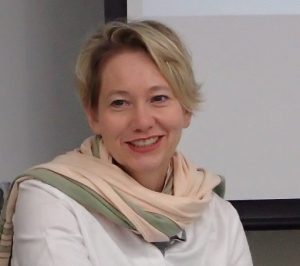As part of a series of international collaborative courses offered by the Social Sciences and Humanities Unit for the Kyoto University Top Global Course (AGST), the Division of Natural Resource Economics will hold an intensive lecture course entitled “Rural Sociology: Transformation in Postindustrial Societies” (Special Lecture on Natural Resources Economics VIB) , taught by Prof. Claudia NEU from the University of Göttingen, Germany.
[Course Title]
Special Lecture on Natural Resources Economics VIB (生物資源経済学特別講義VIB) (Code: FC11000)
“Rural Sociology: Transformation in Postindustrial Societies”
[Number of credits]
1 (one)
[Instructor]
Prof. Claudia NEU
Professor of Rural Sociology, Department of Agricultural Economics and Rural Development, University of Göttingen, Germany
[Schedule]
February 22 (Fri): Lect. 1 (13:00-14:30) + Lect. 2 (14:45-16:15)
February 25 (Mon): Lect. 3 (13:00-14:30) + Lect. 4 (14:45-16:15)
February 26 (Tue): Lect. 5 (13:00-14:30) + Lect. 6 (14:45-16:15)
February 27 (Wed): Lect. 7 (8:45-10:15) + Lect. 8 (10:30-12:00)
[Venue]
Room E217, 2nd Floor, Faculty/Graduate School of Agriculture Main Bldg.
Click here for a map of the venue.
[Language]
English
[Outline and purpose of the course]
One of the primary objectives of this course is to introduce students to the principles of sociology in general and key concepts of rural sociology in particular. In addition, we want to provide the analytical tools for understanding the processes inherent to these concepts. Beyond that, the course aims at enhancing students’ ability to identify different research perspectives and to critically discuss and analyze research strategies and methods.
The approach will generally be a sociological analysis of the transformation of postmodern societies. This development is forced by demographic, economic and social change. Nowadays we observe a differentiation and polarization of rural wellbeing and lifestyle in Europe, the US and Japan. Therefore the theoretical and empirical focus lies on transformation theories, social inequality in general and territorial inequality in special.
[Syllabus and Flyer]
Please see Syllabus and Flyer for further information.
[Registration]
[For Academic Credit]: Registration via KULASIS is already closed.
■Students at GSA (Graduate School of Agriculture):
Please register via KULASIS during the designated registration period:
・September 21-October 11: Timetable creation
・October 12-16: Registration
・October 19-22: Correction
・October 24 (5:00 pm): Confirmation of registration
■Students at other Graduate Schools:
Students at other Graduate Schools also can register for this course via KULASIS. However, the registration period may differ from one Graduate School to another. Please contact the student affairs office of your affiliated Graduate School for more detailed information about the course registration procedure.
[For Non-credit Participation]:
Please register with Assistant Teaching Staff Mr. Makoto Kuroda by contacting him at:
kuroda.makoto.6a[at]kyoto-u.ac.jp (please replace [at] with @)
by January 31, 2019.
[Contact]
Makoto KURODA, Assistant Teaching Staff, Division of Natural Resource Economics, Graduate School of Agriculture
E-mail: kuroda.makoto.6a[at]kyoto-u.ac.jp (please replace [at] with @)
Extension: 6181



